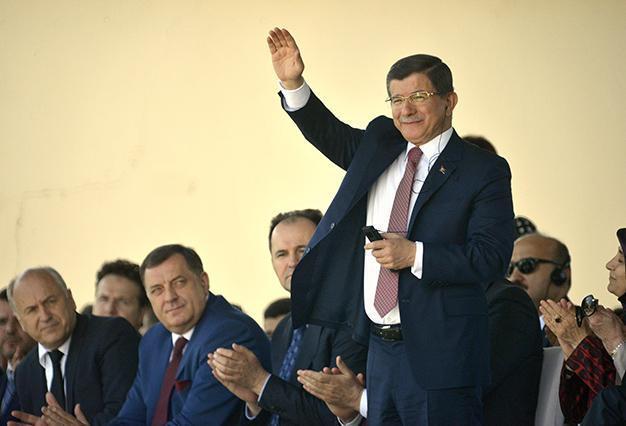Turkish PM’s departure ‘raises investor concerns over significant uncertainty’
Öykü Altuntaş – ISTANBUL - Doğan News Agency

Turkish Prime Minister, Ahmet Davutoğlu, waves to people during a ceremony opening the Ferhat Pasha Mosque in the Bosnian town of Banja Luka, Saturday, May 7, 2016. AP photo
The fallout from the rift between Turkish President Recep Tayyip Erdoğan and Prime Minister Ahmet Davutoğlu has created “significant uncertainty” and heightened investor concerns about the quality of economic policy making, an official from the Institute of International Finance (IIF) has said at the 15th Annual Forum Istanbul.“Against this backdrop, media speculation about the three possible candidates [to succeed Davutoğlu] - all supporters of the president - has raised investor concerns about the quality of the new economic team and its policy making going forward,” said IIF Executive Managing Director Hung Tran in a written statement on May 6.
An extraordinary Justice and Development Party (AKP) convention will be held on May 22 to elect a new chairman and Davutoğlu himself said he would not be a candidate. There are a number of potential candidates for the Prime Ministry, according to some media reports.
According to the IIF, this uncertainty will “persist until the new PM and government are selected.”
The IIF’s session during the forum was on rebalancing global economic governance, but the buzz at the conference was “all about the fallout between Erdoğan and Davutoğlu,” said Tran.
The developments might signal a possible election in August to boost the AKP parliamentary majority and “heightened investor concerns about the quality of economic policy making,” he said.
“Domestic political risks have crystalized at a bad moment for Turkey, as the global ‘risk-on’ sentiment appears to be waning,” he added.
According to the IIF, with more risk-sensitive global investor sentiment, “Turkey’s economic vulnerability again comes to the fore.”
“Together with renewed pressure on the Turkish Lira, after a sharp devaluation last year, any political pressure to cut rates could be counter-productive. In particular, the corporate sector - with around $190 billion in net forex liabilities - could experience stress if the lira weakens further,” stressed the IIF official.
The IIF is the global association of the financial industry with close to 500 members from 70 countries, according to its website.
















